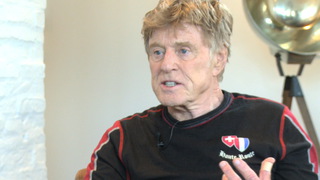
The legendary actor and director Robert Redford founded the Sundance Film Festival in Park City, Utah, in 1978. It’s now among the largest film festivals in the country, with some 50,000 attendees. “What I never expected was for it to grow to the size it is now,” Redford tells Democracy Now! He says the festival may be too large to be sustainable for its small host, Park City, Utah. The solution he says is under consideration is to break up the festival to show narrative films, documentary films and shorts in separate events.
Transcript
AMY GOODMAN: What’s going to happen with Sundance, the film festival? It is getting huge. We’ve covered it for a number of years.
ROBERT REDFORD: I know you have, yeah.
AMY GOODMAN: But how does Park City even sustain this?
ROBERT REDFORD: I don’t think that—
AMY GOODMAN: How many films are submitted every year, now?
ROBERT REDFORD: Twelve thousand.
AMY GOODMAN: How many are chosen?
ROBERT REDFORD: A hundred and sixty.
AMY GOODMAN: How many people come here?
ROBERT REDFORD: Eighty to ninety thousand. First year, 1985, to show you how things have grown, because I didn’t think it was going to work—I was told it wouldn’t. And so I just assumed it wouldn’t, but I thought, well, why not try? You know? So, we had one theater available to us, the Egyptian. It was kind of this run-down theater, which I thought was great, because it was run-down, you know. And then there were maybe three restaurants in town. So the first festival, I was out there with—maybe we had 25 films and maybe five or six documentaries. I’d be standing outside the theater trying to get people in, you know, people wandering around, maybe 100, 200 people wandering around, wondering, “What’s going on here?” And I said, “Why don’t you come in and find out?” Now—I never dreamed, because I didn’t think it would work, quite honestly. I thought this probably is not going to work, but it’s worth a try. Now that it—I think the thing that really kicked it into succeeding was Soderbergh’s film, Sex, Lies, and Videotape. Suddenly something happened. That got enough word of mouth that moved things along, because it started here, before it went to Cannes and so forth. But what I never expected was for it to grow to the size it is now. I never dreamed. Now I think they’ve got a problem, because so many films, so little time, so little space, at the same time Park City is developing like crazy. So, sooner or later, the twain is not going to meet. You know, there’s going to be a crunch, and I think it’s coming.
AMY GOODMAN: And so, what would happen?
ROBERT REDFORD: I don’t know what the solution is, but maybe it might be breaking up the festival. So you say, OK, you come in January, and come end of January, like we have now, and you only show narrative films. And then maybe in February, you have another section of the festival that opens up, and you show documentaries. And then you break into a third section, and you have shorts and online stuff. I don’t know if that works or not. It’s just something we’re—we have to think about.
AMY GOODMAN: That’s Oscar-winning director and actor Robert Redford, founder of the Sundance Film Festival.
That does it for our show. Special thanks to our team here in Park City, to Nicole Salazar, Elizabeth Press, Denis Moynihan, Mike Burke, Amy Littlefield, the entire team here, John Hamilton, as well. I’m Amy Goodman, broadcasting from Park City Television. Thanks for joining us.













Media Options